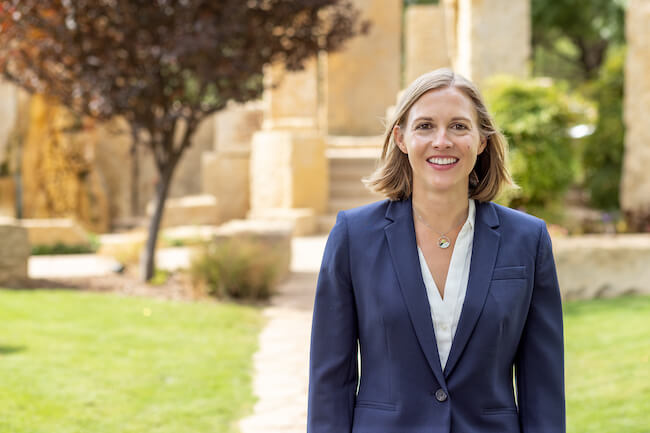Learn More
Embrace Your Passion For Ministry
You have a passion for service and ministering to others no matter what. With ACU’s Master of Arts in Christian Ministry, you will deepen your understanding of Christian Scripture and tradition, explore your ministerial vocation, and learn how to practice ministry effectively.
On-Campus Option
Interested in completing your coursework in Abilene? With our on-campus Master of Arts in Christian Ministry, you can get the same flexible degree program with face-to-face instruction.
About the Program

ACU’s Master of Arts in Christian Ministry is a flexible degree program designed to equip you for competent leadership in ministry fields such as youth and family ministry, children’s ministry and education ministry. This M.A. degree is also ideal if you’re looking to deepen your theological knowledge for a career outside ministry, such as in education or social service.
Program Structure
All the Details on Your Degree
With many elective hours, you are able to personalize your online ministry degree to match your particular ministry passions and interests.
Jump Start Your Master’s Degree
If you plan to pursue a Master of Arts in Christian Ministry or Master of Divinity degree, save money by first enrolling in our Graduate Certificate in Practical Ministry. Simply complete the certificate program, and ACU will seamlessly apply your 18 credit hours toward your master’s.
Required Hours
48 hours
30 months
Cost: $798/Hour with $200 resource fee per term
Example Coursework
Biblical Exegesis
History of Christianity
Systematic Theology
Foundations of the Theology of Ministry
Department
Upcoming Start Dates
May 4, 2026
August 24, 2026
Meet the Program Director

Dr. Tera Harmon, Master of Arts in Christian Ministry
Dr. Tera Harmon is an assistant professor in Abilene Christian University’s Graduate School of Theology. After receiving a BA in Biblical Text and an MDiv from ACU, she went to the Catholic University of America to study patristics, completing a Ph.D. in Church History in 2016. Her major field of study is Greek patristics and has done work on Gregory of Nyssa. She teaches courses on the history of Christianity and is the Director of Distance Learning for the Graduate School of Theology. She has lived in Washington D.C.; Charlotte, North Carolina; Los Alamos, New Mexico; and now lives in Abilene, Texas with her husband, David Todd, and their three children.
Spotlight

We’re proud to announce we’ve officially launched a Certificate in Practical Ministry for ministers seeking theological and ministerial training. Aimed at meeting the fluctuating needs of ministry today, ACU’s Graduate School of Theology designed this stackable certificate to equip newly appointed ministers and church leaders with the skills, strategies, and knowledge necessary to become effective church leaders while simultaneously guiding them through one of six key concentrations, including youth and family, children’s, worship, preaching, spiritual formation and church leadership.

Why Study Theology?
There are four benefits to studying in ACU’s Graduate School of Theology. Learn what they are now, in our latest blog post!

Four Benefits of Getting a Theology Degree at ACU
When it comes to theology master’s programs, what makes ACU’s stand out? Hear directly from Dr. Myles Werntz, Director of ACU’s Baptist Studies Center, in a recent blog post.

Faculty Spotlight: Tera Harmon
Meet Dr. Tera Harmon, assistant professor and director of distance learning for the Graduate School of Theology for ACU. Tera’s goal as an ACU graduate turned faculty member is to not only inform students through vocational teaching, but to form them through mentorship into the person God created them to be.

Upon completion, graduates will be able to:
- Demonstrate a basic understanding of the history of the Christian faith.
- Exhibit knowledge and skills related to a particular aspect of ministerial practice.
- Integrate theological and theoretical concepts with concrete ministry situations.

To be considered for admission, students must:
- Complete the program application accompanied by a non-refundable processing fee.
- Submit an official transcript of all previous colleges attended. The transcript must indicate an earned bachelor’s degree from a regionally accredited college or university or equivalent.
- Have a cumulative undergraduate approximate B average or above in the area of focus or related area and evidence of an overall productive GPA.
- Submit two letters of recommendation.
- A reflective essay 3-5 pages typed, double spaced
- Complete an academic writing assessment

The Graduate School of Theology is accredited by the Commission on Accrediting of the Association of Theological Schools, an organization of more than 250 graduate schools that conduct post-baccalaureate professional and academic degree programs to educate persons for the practice of ministry and for teaching and research in theological disciplines.
